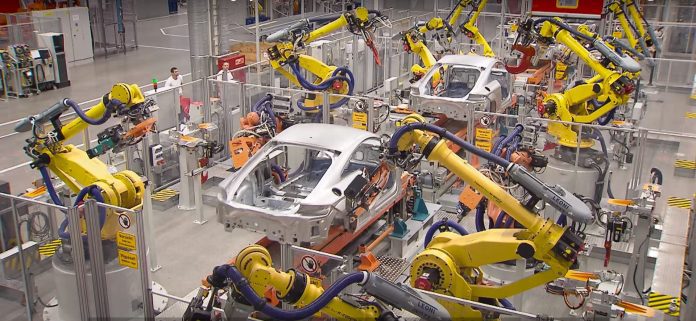Srinivas Garigipati, chief technology officer for the manufacturing business group at Tata Consultancy Services (TCS), talks with Enterprise IoT Insights about the impacts of incoming 5G technology on the broad industrial space, covering product manufacturing, and running through the entire supply chain.
How much interest is there from industry in 5G?
“There is a a lot of excitement around the potential 5G has to disrupt a wide variety of industry offerings. The manufacturing industry is one of the industries at the forefront of benefiting from the advancements in connectivity. 5G offers an immense opportunity for the automotive segment to reimagine the connected vehicle offerings and expedite autonomous vehicle development and shared mobility transformational journeys.
“5G provides a means to build smart factories with connected products and services by leveraging emerging technologies such as artifcial intelligence (AI), augmented reality (AR), virtual reality (VR), and advanced analytics. It provides the backbone for business transformation journeys and advancements in manufacturing. It has a potential to cause waves of disruption around the paradigm of customer experience across the industries.
“Manufacturers are not only on a constant look out for ways and means to optimise their processes and rationalise costs, but also to transform their product portfolio by leveraging innovative tools and technologies for a better user experience and a means to capture the services business.
“5G caters to the necessary connectivity capabilities for manufacturers to exponentially expand upon their existing tool to figure out innovative ways to venture out new business models and expand their engagement form the current B2B to B2B2C. The enhanced connectivity would also offer a means to cut costs and minimize downtimes throughout the entire value chain. The potential applications of connectivity are limitless in manufacturing.
What use cases can be supported by 5G in manufacturing that cannot be supported by LTE?
“While LTE gave manufacturers basic connectivity capabilities, 5G’s high-bandwidth supplies manufacturers with unmatched capacity and speeds. This will open the doors for the next-generation connected factories, products and services which make use of automation, AI, digital twins, and advanced analytics [and achieve] a seamless integration between the shop floor, enterprise, products and customers.
“The high bandwidth and speed of 5G [brings the] ability to capture and analyse larger volumes of data and produce further actionable insights to increase productivity, reduce cost, and define new business models. 5G will minimise latency between analytics technologies and shop-floor machinery, so data can be analysed in real-time and [maintenance of machines can be made predictive].
“5G will allow manufacturers to connect smart sensors, devices, and other machinery through a single private network, allowing a more agile and fluid infrastructure to be in place. 5G takes what LTE made possible, and expands upon it in every way imaginable.”
What use cases will be supported by 5G in supply chain / logistics that cannot be supported by LTE?
“5G will help manufacturers to optimise processes along the near and far edges of both the inbound and outbound supply chain. Manufactures would be able to super optimise their parts inventory through an accurate just-in-time (JIT) planning by being able to leverage the power of 5G-enabled sensors, machine learning (ML), deep learning (DL), and blockchain technologies to implement multi-tier supply chain visibility models.

“The other way the supply chain will benefit is in its unparalleled after-market services, and communication between the end-user equipment and the shop floor in real-time or near real-time. Using 5G, manufacturers will be able to optimise their after-market inventory, as well as plan for and deliver exceptional customer experiences and services by leveraging the advanced analytics models.
“End-user equipment, for example, will be able to transfer real-time data back to the manufacturers, allowing them to predict the situations and have spare parts and service requests queued up prior to part or device failure.
“Similarly, logistics services to predict and maintain services needed at the near edge will be optimised as well. Manufacturers will be able to predict when equipment or machine parts need repair or replacement. Manufacturers that deal with third-party suppliers and dealers, will be able to place JIT orders to optimise the inventory and offer an enhanced customer experience.
“5G enables the capability to take full advantage of emerging technologies in the production scenarios, which will help manufactures to minimise downtimes and maximise shop-floor uptime.”
Which other technologies are impacting manufacturing? Which of these is most significant?
“Additive manufacturing, AI, AR, VR, edge computing, blockchain, cloud, and advancements in IoT are changing the manufacturing industry today in a big way. 3D printing is becoming more important than simply a prototyping tool. Manufacturers are finding ways to use rapid additive capabilities to provide unique, hyper-personalised products and after-market services to the end-user.
“Additionally, AR and VR will be reimagined when used in tandem with 5G connectivity. Shop-floor workers will be able to utilise AR and VR tech, seamlessly and be mobile – for training purposes, design, simulation testing, and more. While all of these technologies are significant in keeping up with industry and customer demands, maintaining IoT advancements allows manufacturers to utilise real-time information and complete essential tasks through hand-held devices.
“Utilising this process with 5G will improve agility of operations of every magnitude. 5G-connected sensors and equipment will lead to a new era of AI/ML adoption right form the shop floor to the end product, including the end-customer experience, laying foundations for the next generation business models and new revenue streams for manufacturers.
Which other technologies will impact the supply chain? Which of these is most significant?
“3D printing is certainly causing waves of disruption throughout the supply chain – specifically in the after-market. Consumers are looking for fully customisable products and experiences – and 3D printing, both plastic and metal, provides manufacturers with the ability to deliver just that.
“It also allows manufacturers to identify added-value streams, by opening the doors for limitless after-market potential – providing the end-user with the freedom to create the perfect personalized product, that is unique to them.
“Blockchain is another promising technology, especially in the context of multi-tier supply chain visibility to be able to obtain end-to-end traceability. These combination of emerging technologies and hyper connectivity has a lot to offer in disrupting the supply chain right, from the source to the product and from product to the end customer experience.”

